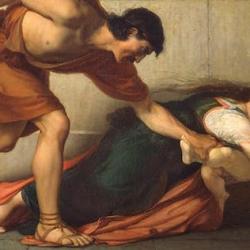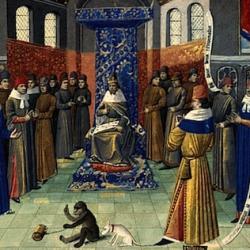Thomas Small doesn’t think Hugh Kennedy’s Caliphate gives enough attention to the theological roots of the Caliphate. In his TLS review, he writes wryly: “Reading Kennedy’s account of the Caliphate, you’d be forgiven for forgetting that there’s anything particularly religious about it.”
According to Small, the Caliphate is a thoroughly religious institution and idea, part of the “political theology” that was early Islam, a political theology that “sacralized” war precisely by sacrilizing the caliph. “An early caliph didn’t need a pope to hand him a crown,” he writes, “not because there wasn’t a religious figure to do so, but because the caliph himself was the religious figure, the fons et origo of spiritual identity and legitimacy for the umma.”
Small continues, “Ignoring or playing down the way Islam in particular sacralizes warfare is to obscure much. Islam was originally a political theology that went something like this: Out of all the peoples and tribes of the world, God chose a tribe of Arabia called Quraysh to carry out his final plan for humanity. From among their number he selected a prophet, revealed his will to him “in clear Arabic”, and instructed him to establish the quintessential divinely ordained polity at Medina. But the death of this prophet was still just the beginning of the story. The Quraysh remained God’s chosen instrument, despite the non-Qurashis swelling their ranks. And though the umma disagreed about how they could determine God’s will in the matter of who exactly was to be caliph — whether by tribal deliberation, patrilineal heredity, trial by combat, or a combination of the three—it was a matter of faith (except for some outlying schismatics) that God intended him to be a Qurashi, and that under his charismatic leadership the Qurashis would extend God’s sovereignty across the earth until every worldly power was placed under his dominion.”
Emphasizing theology has the advantage of placing Islam where it belongs, in late antiquity, in continuity with a history of sacral kingship that begins (at least) with Alexander: “the caliphs were not mere kings: they were truly sacred, truly universal monarchs—and like Alexander (whose career the Qur’an sanctions), they were monarchs on a mission. From earliest times, mounting a jihad was the prerogative of the caliph, in line with his divinely ordained task of submitting the world to Islam. . . . Islam belongs to late antiquity. In many respects it is late antiquity’s crowning achievement. This is when the idea of universal monarchy, first espoused by Alexander the Great a thousand years before, finally transformed from a political proposition into a theological dogma—and nowhere more fully than in Islam.”















